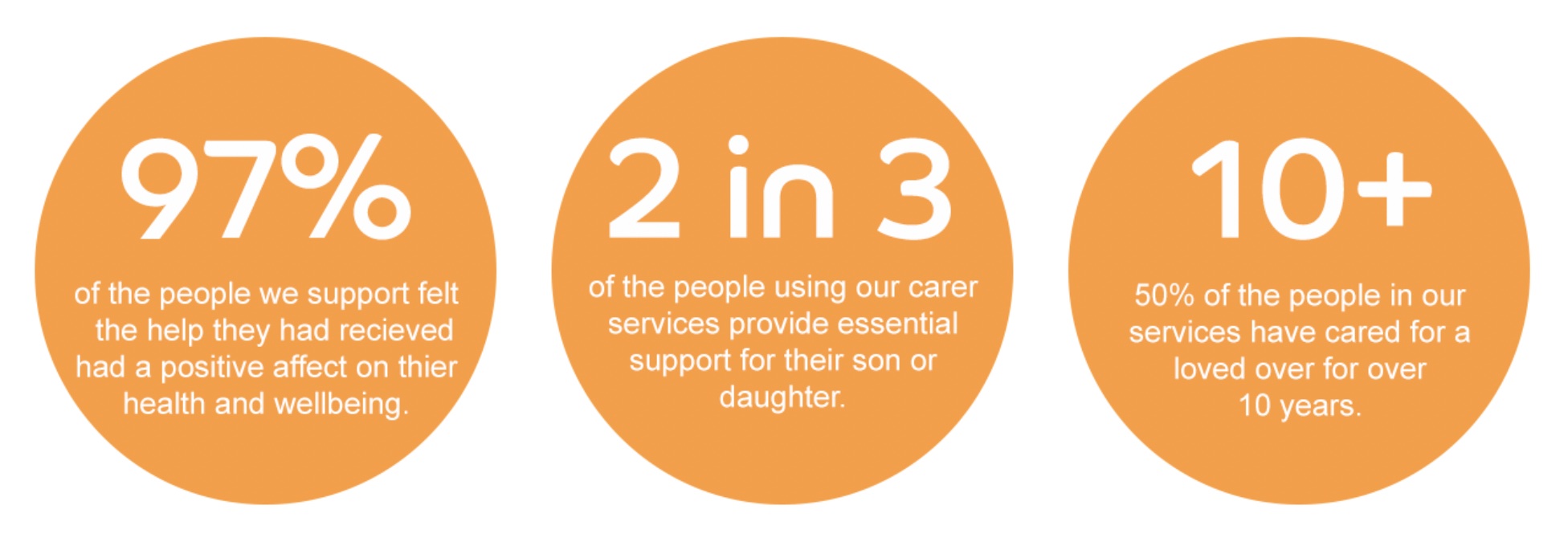Caring for Carers: The Carers Oxfordshire Service
03/06/2021

From the small group of relatives who met in 1972 and founded our charity, to the network of peer support groups and services we currently run across England - one theme more than any other underpins our work: caring for carers. Today, we run over 140 peer support groups and services that provide support, practical advice and a listening ear to the hundreds of carers we meet every year.
One such service is our Oxfordshire Carers Support service. We spoke to Kay, the Head of Carers Support Services in the county, to learn more about this unique service:
Can you tell us about yourself and the service?
My Name is Kay Francis, and I am Head of Carers Support Services in Oxfordshire. Together with our partners, Rethink Mental Illness, we are commissioned to provide The Carers Oxfordshire Service.
We support carers by: offering in-person carer support, facilitating peer support, training, and advocacy to help carers navigate the wider Oxfordshire social and health care mental health networks. We also provide support and training for our health and social care colleagues across the county.
When you deliver carers services, how do you identify the needs of the carers you are meeting?
This is a very interesting question! First and foremost, we listen to the carers we are here to support. It is their experiences that help guide and shape the services we provide. We also work closely with other stakeholders in the local area, other carer support services and mental health professionals and local commissioners. The Care Act also provides us with a legal framework that we need to meet. These parts all help shape our service and help us improve the support carers receive.
What do you think is different about caring for someone living with a mental illness? How does this differ from other carers?
In my experience, carers needs remain very similar no matter who they are caring for; e.g. managing stress, social isolation, impact on physical and mental wellbeing, financial hardship are just a few familiar themes.
However, the difference is the support needed for the carer, the intensity of living with a loved one with a mental health condition that can often be unpredictable and constantly changing, that requires the specialist level of support.
We know that many carers can be resistant to identifying themselves as a 'carer' – what do you think are the reasons for this?
From my experience working with carers, there are many reasons why people can find it difficult or are reluctant to identify as a 'carer'. Caring for someone is often seen as an extension of your relationship with them; for example, if you care for one of your children, most carers see this just as part of being a good parent. Sometimes admitting there is a change in their relationship is very difficult; for example, when a husband becomes a carer, it may mean life will never be the same. Many carers feel they lose a bit of themselves once they have the label of Carer, so they are reluctant to identify with that term. But this means they can be at risk of missing out on the support and information that is available to them, and that will help them as a carer.
Is there any general advice you would give to people in a caring role?
I would tell them that they need a moment in every day where they can put aside their caring role and think of their own needs; that could be a fifteen-minute mindfulness session or maybe an extended respite break away. Your loved one would want you to be well, even if they don't always convey this message.
Please tell us about the kinds of feedback you get from carers who use your service?
Many people who use our service tell us that having somebody to talk to when they need it is essential in making them feel valued and less isolated. Our carers often tell us that the advice and advocacy we provide has helped them during difficult periods; staff regularly receive praise for their positivity and kindness.
Is there any general advice you would give to commissioners or other providers of carers services?
Nationally, carers save the state over £132 billion every year - this is the equivalent cost of the whole NHS. Carers give up so much to look after a loved one, they need to be supported so they can maintain their health and wellbeing too. We need to invest more in local carers support services to support this hidden army - without them, our NHS and social care system would be on its knees.
In the spirit of generous leadership for other care services providers, what helped you choose Rethink Mental Illness as a sub-contractor?
Working in the third sector often means that different charities are trying to compete for the same contracts, which is never healthy. Rethink Mental Illness had an established and respected place in the county's mental health team, and we already had developed strong links with the organisation. The opportunity to create a partnership in Oxfordshire and receive an equitable level of support was vital. The service also needed to connect the local carers team into the broader community so that our offer to carers felt seamless across all points of contact.
About our carers

Rethink Mental Illness is a leading charity provider of mental health services in England. We support tens of thousands of people through our groups, services and advice and information. For more information about commissioning our services, please download our commissioner guide, or call our team on 020 7840 3039
